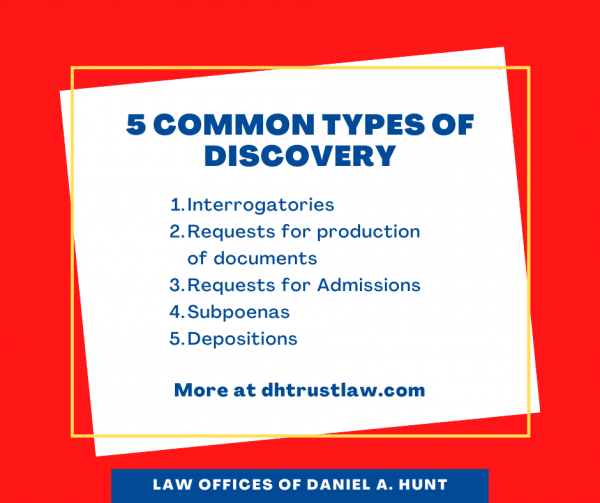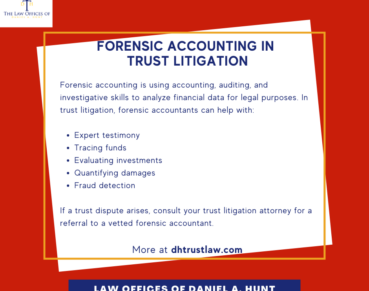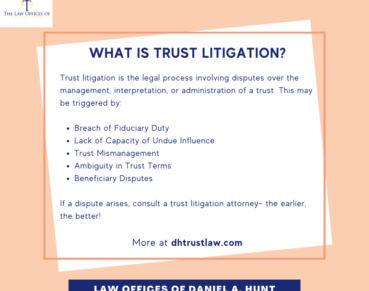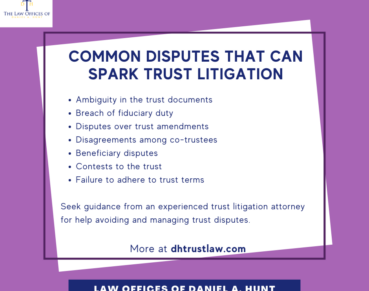What is Discovery in Trust Litigation?

When a trust or estate conflict evolves into litigation, one of the first steps in preparing for a trial is formal discovery. Discovery is a legal procedure in which both sides of a lawsuit discover relevant facts of the case in order to prepare for trial. Whether you’re the trustee who is being sued or a trust beneficiary suing a trustee, you’ll need to understand what facts can and can’t be discovered and how to best approach the discovery process.
Common Forms of Discovery in Trust Litigation
The basic rule of discovery is: You can request any information that is even remotely relevant to the issues within the lawsuit, so long as that information isn’t “privileged” or otherwise legally protected.
Here are some of the common tools used in a formal discovery, divided into two categories of written and oral:
- I. Written Discovery
- Interrogatories: Written questions directed to the other side. The other party must provide written answers under oath which can be used at trial.
- Requests for production of documents: Written requests for a specific document or a class of documents likely to be relevant to your case.
- Requests for Admissions: Written requests to the other party to admit that a statement is true so the case can focus on the main issues being disputed. Responses can be used at trial.
- Subpoenas: Written court orders requiring one side or a third party to testify or produce physical evidence for inspection, such as medical, bank, or business records.
- II. Oral Discovery
- Depositions: Oral, in-person interviews with a party in the case or a third party directly involved in the case. The person being deposed must answer under oath. A court reporter typically writes down everything that is said and produces a written transcript.
What Is Excluded from Discovery?
Some “privileged” information remains off-limits during the discovery process. Generally, this includes:
- Attorney-client communication
- The attorney’s work product in preparing their legal case
- Trial preparation materials
- Information that is irrelevant to the specific case at hand
California Attorneys are bound by the California State Bar’s Rules of Professional Conduct to engage in ethical discovery methods.
Discovery Time Frame
The total length of the discovery process can vary widely. The following requirements must be met before the discovery process can begin:
- One of the parties must file an action with the court.
- That party must personally serve the court papers to the opposing party.
- Ten (10) days must pass after personal service has occurred before discovery can begin.
For written discovery, the other party has 30 days to respond, plus 5 days to allow for mailing.
For subpoenas to third parties (like medical or bank records), the institution must issue a document to the person whose documents are requested called “Notice to the Consumer”. That person will have 15 days to object to the request. After that time period has passed, assuming no objections were made, most institutions typically respond within 15-20 days.
Cost of Discovery in Trust Litigation
All parties pay the cost of their own discovery. If a party later files a Motion to Compel (asking the court to enforce a request for information relevant to a case) and the court grants that motion, then the prevailing party may be entitled to attorney’s fees.
For both parties, it’s best to be forthcoming and provide the requested information; otherwise, you risk paying the opposition’s attorney fees.
Discovery Can Save Money Later On
A full-blown court trial is often long and expensive. Discovery can be cost-effective in the big picture, especially if it leads to the parties settling. While discovery can be expensive, it can actually save money by leading the parties to settle the case either before the trial starts or before the end of a full trial.
If you think of the trial as a poker game, discovery is like getting to peek at the opposing player’s cards before the game begins. Through discovery, both sides get a sense of the strength of their side’s position. If you clearly have a winning hand, the opposition may opt to fold before the game even begins.
Discovery Tips for Trustees
If you are a trustee, we offer the following advice for discovery:
- Stay organized and keep accurate records of everything you’ve done in the trust administration.
- Always be honest and forthcoming! Provide all information to your attorney and the trust beneficiaries.
Discovery Tips for Trust Beneficiaries
If you are a trust beneficiary involved in discovery, you will “bear the burden of proof”. This means that you carry the responsibility to show evidence that the trustee has mishandled the trust administration.
Because of this, you will likely be the party making the bulk of the discovery requests. As you approach discovery, think through exactly what information you want to request and what questions you would like answered. Communicate all of this to your trust litigation lawyer.
Remember that discovery often requires knowledge of evidence rules and other technical legal strategies. If discovery becomes necessary, you will want to hire an experienced trust and estate litigator to represent you and build your case. If you have any questions about the discovery process, feel free to contact our office.
Law Offices of Daniel A. Hunt
The Law Offices of Daniel A. Hunt is a California law firm specializing in Estate Planning; Trust Administration & Litigation; Probate; and Conservatorships. We've helped over 10,000 clients find peace of mind. We serve clients throughout the greater Sacramento region and the state of California.




